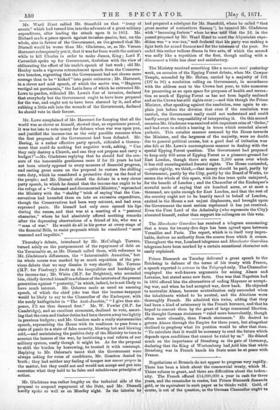Mr. Lowe complained of Mr. Harcourt for fancying that all
the world was as clever as himself, showed that, as experience proved, it was too late to vote money for defence when war was upon you, and justified the income-tax as the only possible resource when the first proposals of the Government had been defeated. Mr. Baring, in a rather effective party speech, ridiculed a Govern- ment that could do nothing but negative work, asking, " Can they only destroy a Church, and can they not propose and carry a budget ?"—Mr. Gladstone replying that he should feel the cen- sure of the honourable gentleman more if for 25 years he had not been utterly opposed to every measure of financial progress, and casting great scorn on the proposal to restore the shilling corn duty, which he considered a protective duty on the food of the people ; and Mr. Disraeli closed the debate in a very clever party speech, in which he denied that the income-tax ought to be the refuge of a "distressed and disconcerted Minister," reproached the Ministry with the " shabby " trick of saying-that the Con- servatives had hounded them on into an excessive expenditure, though the Conservatives had been very reticent, and had even repressed panic. He himself had only once opened his lips during the recess, and that was at a meeting of a "pastoral character," where he had absolutely offered soothing remarks after the depressing observations of a friend of his, who was a "man of war." He would do all in his power at every stage of the financial Bills, to resist proposals which he considered "most unsound and impolitic."
































 Previous page
Previous page